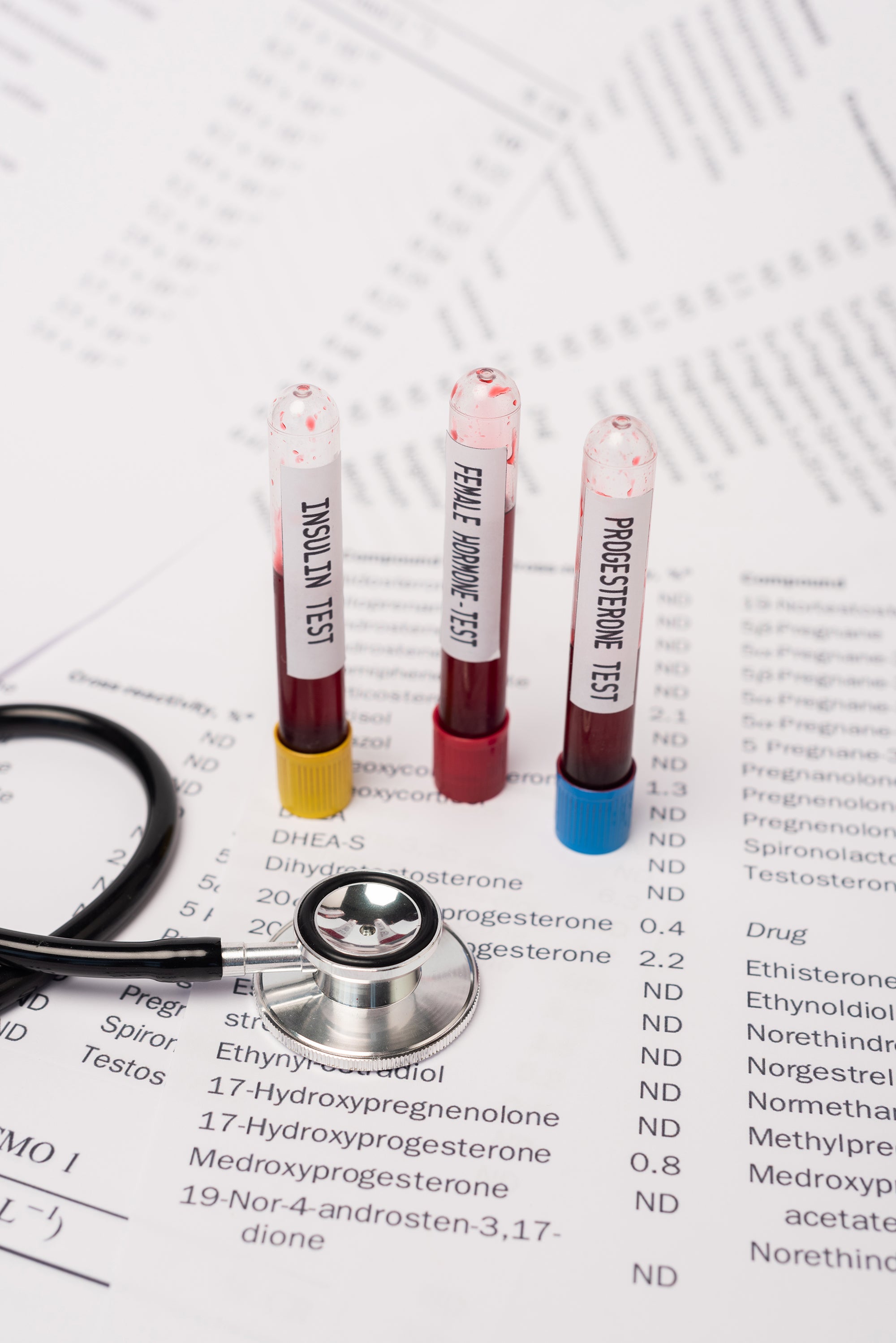Key messages on cortisol and burnout
💡 Cortisol is the body's stress hormone and affects energy and health.
💡 An imbalance can promote fatigue, sleep problems, and burnout.
💡 Blood tests help identify stress levels and take targeted action.

Cortisol and Stress in Everyday Life
In our fast-paced world, the demands on body and mind are constantly increasing, and many people feel increasingly overwhelmed and stressed. Chronic stress is one of the main triggers for the so-called burnout syndrome – an exhaustion crisis that can have serious health consequences in many cases.
A central role in stress management is played by the hormone cortisol. But what is it, what is the cortisol level, and why is the cortisol value so important? In this article, we take a look at the function of cortisol, the importance of a healthy cortisol level, and the reference ranges used to assess this value. Additionally, we introduce other important values that contribute to stress and burnout diagnosis.
We also recommend the excellent article by AOK for more in-depth information: How cortisol and stress are related as well as the article by Helios Health.

What is Cortisol? – An Overview of the Stress Hormone
Cortisol, often referred to as the "stress hormone", is produced in the adrenal cortex and plays a central role in responding to stressful situations. During stress phases, cortisol levels rise to make the body alert and release energy reserves – an adaptation that was vital for survival in human evolution to quickly respond to threats.

Cortisol and Burnout — What Happens in the Body?
Burn-out is much more than "just" stress – it is a profound physical and mental exhaustion that is often closely associated with
a disrupted cortisol level . A cortisol burnout occurs when the body releases too much cortisol over a long period, causing an imbalance. What does cortisol do in the body? It provides short-term energy, alertness, and increased performance. However, with chronic stress, the cortisol level remains permanently elevated, which can lead to sleep disorders, weight gain, concentration problems, and a
weakened immune defense.
What increases the cortisol level?
Various factors can increase the
cortisol level: persistent stress, lack of sleep, unhealthy diet,
lack of exercise, and certain illnesses.Also, psychological stress and
overload in everyday life are common triggers for an increased
cortisol level and thus for the risk of cortisol burnout.
What happens during a burnout?
In a burnout, the cortisol level is
initially permanently elevated, which overloads the body. Over time,
the reserves become depleted, the cortisol level drops, leading to severe exhaustion,
lack of drive, and increased susceptibility to infections. The entire organism
becomes unbalanced.
Cortisol Burnout — Values and Reference Ranges
Measurement Instructions
To correctly interpret the cortisol level, it is important to know the natural fluctuations throughout the day. Cortisol follows a circadian rhythm that varies depending on the time of day.
In the morning, the cortisol level reaches its peak to activate the body for the day and enhance performance. Over the course of the day, the level should gradually decrease so that it is low in the evening, helping the body to relax and fall asleep.
Disruptions of this rhythm – such as consistently elevated levels or a high cortisol level in the evening – can indicate chronic stress, burnout, or other stress-related illnesses. Accurate measurement helps to detect these deviations early and take targeted countermeasures.
Reference ranges depending on the time of day
The cortisol level varies throughout the day and follows a natural rhythm. The reference values for healthy adults are:
Morning (7–9 AM): 200–700 nmol/L
Afternoon: 100–400 nmol/L
Evening: &< 100 nmol/L
Suitable tests for cortisol, burnout, and stress
Too much cortisol – what to do? How to: recognize symptoms
An imbalanced cortisol level – whether permanently elevated or too low – can affect the entire body. Since cortisol plays a key role in energy balance and stress management, imbalances often lead to symptoms that develop gradually and are easily overlooked or attributed to other health issues.
What does too much cortisol do in the body? The symptoms:
- Chronic fatigue and exhaustion: Despite adequate sleep, affected individuals feel constantly tired and lacking energy.
- Weight gain, especially in the abdomen: Cortisol promotes fat storage, particularly in the abdominal region.
- Sleep disturbances: An elevated cortisol level makes it difficult to fall or stay asleep, especially in the early morning hours.
- Concentration and memory problems: High cortisol levels impair brain function and lead to concentration difficulties.
- Mood swings and irritability: A disrupted cortisol level affects the neurotransmitters, which can lead to mood swings and irritability.
- High blood pressure and heart palpitations: Cortisol increases heart rate and can raise blood pressure in the long term – a risk factor for cardiovascular diseases. A lipid check can provide insight here.
- Weakened immune system and allergies: A permanently elevated cortisol level weakens the immune system and increases susceptibility to infections.
Important: If you notice one or more of these symptoms, a cortisol test can provide valuable insights. Early diagnosis and targeted measures can effectively manage the effects of a disrupted cortisol level.

Specific symptoms in women– What does cortisol do in the body?
An unbalanced cortisol level can cause additional or intensified symptoms in women, closely related to hormonal fluctuations and the menstrual cycle.
Typical symptoms in women:
- Irregular menstrual cycle or missed periods: A persistently high cortisol level affects the hormonal status and can lead to menstrual disorders.
- Changes in skin health: Many women experience increased skin problems, such as acne or dry skin, with elevated cortisol.
- Increased hair loss: Hormonal imbalances and persistent stress can lead to hair loss or thinning hair.
- Stronger PMS symptoms: Women often report increased premenstrual complaints such as headaches, mood swings, and water retention.
- Loss of libido: A disrupted cortisol level can affect the sex hormones, such as testosterone, and reduce sexual interest.
- Increased risk of osteoporosis: Long-term high cortisol levels can decrease bone density and thus increase the risk of osteoporosis, especially in women.
These symptoms illustrate how significantly the hormone cortisol can affect not only general health but also the female hormonal balance and well-being.An early check of cortisol levels offers women the opportunity to take targeted countermeasures and sustainably support their women's health.

Other relevant values for burnout diagnosis besides cortisol levels
In addition to cortisol levels, there are other important blood values that provide information about the body's stress load and degree of exhaustion:
- Folic Acid: Folic acid is essential for cell regeneration and the production of neurotransmitters. A folic acid deficiency can contribute to exhaustion, cognitive impairments, and impaired stress management. Folic acid is also important for blood formation and the nervous system.
- Transcobalamin (Vitamin B12 Transport Protein): Transcobalamin binds Vitamin B12 and transports it into the cells. A deficiency can lead to Vitamin B12 deficits, which impair the nervous system and cognitive function and promote symptoms such as fatigue, mood swings, and memory problems – symptoms often associated with burnout.
- DHEA (Dehydroepiandrosterone): DHEA is a hormone that is also produced in the adrenal glands. A healthy DHEA level is important because an imbalance between DHEA and cortisol can indicate chronic stress.
- CRP (C-reactive protein): An inflammation marker in the body. Chronic stress can lead to an increased tendency for inflammation, which can be measured by the CRP level.
- Vitamin D: Vitamin D is important for the immune system and overall energy production. A low vitamin D level can contribute to fatigue and susceptibility to illness.
- Blood sugar: Stress can increase blood sugar because cortisol boosts the body's glucose output. Prolonged elevated blood sugar can indicate chronic stress.
- Thyroid values (TSH, T3, T4): Since the
thyroid also responds to stress, altered thyroid values can be a sign of body exhaustion. A simple thyroid check can help here.
By combining these values, the health status can be better assessed and the relationship between stress and physical condition can be determined more precisely.
Prevent Cortisol Burnout – Next Steps for Your Health
With Probatix, you can conveniently test your cortisol level – either at home or directly in the pharmacy. The process is straightforward:
- Order Home-Testing Kit and have it delivered to your home.
- Collect the sample independently – quickly and easily.
- Receive results: Your values are reliably analyzed and made available online.
A cortisol test from Probatix helps you to detect stress levels early and actively prevent burnout – without long waiting times or doctor visits.
Summary: Keeping an eye on your health
A balanced cortisol level is crucial for your well-being and stress management.A permanently elevated or disturbed cortisol level can indicate chronic stress and increase the risk of burnout.
In addition to cortisol, other values such as DHEA, CRP, and Vitamin D are valuable indicators for assessing stress levels.
With Probatix, you can test these important blood values easily and reliably from home. This way, you can always keep an eye on your health and take targeted measures to lower your cortisol level and sustainably improve your well-being.
FAQ: Frequently Asked Questions Cortisol and Burnout
What is cortisol and what function does it have in the body?
What is cortisol and what function does it have in the body?
Cortisol is a hormone produced in the adrenal cortex and released during stress. It helps the body respond to stressful situations by releasing energy and increasing blood sugar. However, cortisol also has many other functions, including regulating blood pressure and supporting the immune system.
What symptoms occur with an unbalanced cortisol level?
What symptoms occur with an unbalanced cortisol level?
An unbalanced cortisol level can lead to fatigue, sleep disorders, weight gain, concentration problems, and high blood pressure. Women may also suffer from menstrual disorders, hair loss, and more severe PMS symptoms.
How is the cortisol level measured?
How is the cortisol level measured?
The cortisol level can be measured through a blood, saliva, or urine sample. Measuring at specific times of the day provides particularly meaningful results, as the cortisol level naturally fluctuates throughout the day.
What reference values apply to cortisol levels?
What reference values apply to cortisol levels?
The reference values for cortisol vary depending on the time of day. In the morning, cortisol levels should be between 200 and 700 nmol/L, in the afternoon around 100–400 nmol/L, and in the evening below 100 nmol/L. Deviations may indicate chronic stress or other health issues.
What causes a persistently elevated cortisol level?
What causes a persistently elevated cortisol level?
A persistently elevated cortisol level can be caused by chronic stress, lack of sleep, overweight, an unhealthy diet, and certain conditions such as Cushing's syndrome. In the long term, a high cortisol level can promote health problems.
How can you lower cortisol levels?
How can you lower cortisol levels?
Cortisol levels can be lowered through regular exercise, adequate sleep, relaxation techniques such as meditation, and a healthy diet. Avoiding caffeine and nicotine, as well as maintaining social contacts, can also help regulate cortisol levels.
What is a cortisol deficiency and what effects does it have?
What is a cortisol deficiency and what effects does it have?
A low cortisol level can lead to fatigue, low blood pressure, dizziness, and a weakened immune system. These symptoms often occur with adrenal insufficiency, which can result from chronic stress or prolonged cortisol overproduction.
Why are cortisol levels particularly important in women?
Why are cortisol levels particularly important in women?
In women, an imbalanced cortisol level can additionally affect hormonal fluctuations, leading to cycle disorders, increased PMS symptoms, and skin problems. In the long term, a high cortisol level increases the risk of osteoporosis, which is particularly significant for women.
Can you test cortisol levels yourself?
Can you test cortisol levels yourself?
Yes, cortisol levels can be measured with a simple home test. A sample, such as a saliva or blood sample, is taken and analyzed in the laboratory. This way, you can conveniently check cortisol levels from home.
Why is the cortisol level higher in the morning than in the evening?
Why is the cortisol level higher in the morning than in the evening?
The cortisol level is higher in the morning as it prepares the body for the day and provides energy. During the day, the level decreases to be low in the evening, preparing the body for recovery and sleep.







